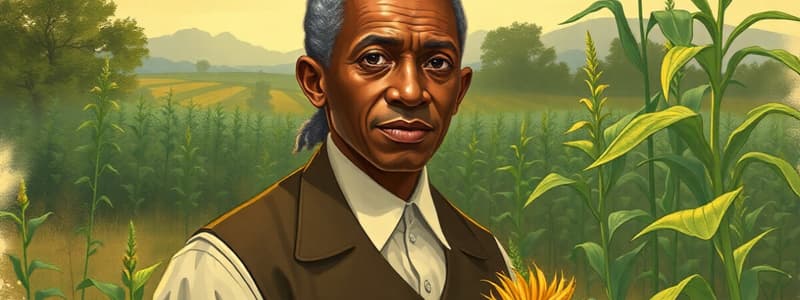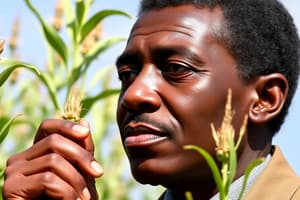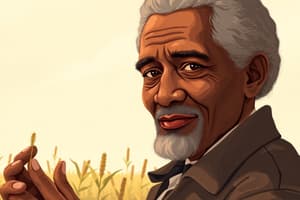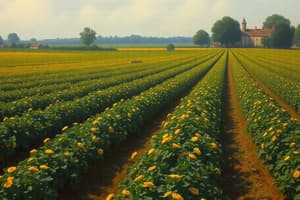Podcast
Questions and Answers
What was one primary crop that led to soil depletion in the Southern US during Carver's time?
What was one primary crop that led to soil depletion in the Southern US during Carver's time?
- Soybeans
- Peanuts
- Sweet Potatoes
- Cotton (correct)
Which institution did Carver join to further his work in agriculture?
Which institution did Carver join to further his work in agriculture?
- Harvard University
- Howard University
- Iowa State College
- Tuskegee Institute (correct)
In what year did Carver earn his master's degree in agriculture?
In what year did Carver earn his master's degree in agriculture?
- 1896 (correct)
- 1894
- 1900
- 1902
How many marketable products did Carver develop from peanuts, sweet potatoes, and soybeans?
How many marketable products did Carver develop from peanuts, sweet potatoes, and soybeans?
What did Carver identify as essential for achieving freedom and prosperity?
What did Carver identify as essential for achieving freedom and prosperity?
Which prestigious award did Carver receive in 1923 for his achievements?
Which prestigious award did Carver receive in 1923 for his achievements?
What was one of the products Carver developed from the crops he promoted?
What was one of the products Carver developed from the crops he promoted?
During which period did Carver develop the majority of his peanut and sweet potato products?
During which period did Carver develop the majority of his peanut and sweet potato products?
Flashcards
Who was George Washington Carver?
Who was George Washington Carver?
George Washington Carver was an African American scientist who worked to improve agriculture in the South in the late 1800s and early 1900s.
What was the Southern agricultural problem Carver saw?
What was the Southern agricultural problem Carver saw?
Carver recognized that the South heavily relied on cotton and that this caused the soil to become depleted of nutrients. This led to low crop yields.
What did Carver suggest as a solution?
What did Carver suggest as a solution?
Carver encouraged farmers to grow crops like peanuts, soybeans, and sweet potatoes. These crops would bring back nutrients to the soil, improving its fertility.
How did Carver's solution lead to financial gain?
How did Carver's solution lead to financial gain?
Signup and view all the flashcards
What was Carver's perspective on education?
What was Carver's perspective on education?
Signup and view all the flashcards
What was the impact of Carver's work on the lives of people in the South?
What was the impact of Carver's work on the lives of people in the South?
Signup and view all the flashcards
What is the lasting impact of Carver's work?
What is the lasting impact of Carver's work?
Signup and view all the flashcards
What makes Carver's work significant in the world?
What makes Carver's work significant in the world?
Signup and view all the flashcards
Study Notes
George Washington Carver
- African American agricultural scientist and experimenter
- Restored the Southern US economy using soil improvement and innovative crop methods
- Developed commercially viable products from crops like peanuts and sweet potatoes
- Born into slavery in Missouri, pursued education after emancipation
- Earned a master's degree in agriculture in 1896
- Became director of agriculture at Tuskegee Institute, led by Booker T. Washington
- Improved Southern agriculture concurrently
- Developed 287 peanut-based products and 118 sweet potato-based products (1900-1920)
Restoring the Economy
- Late 19th century: Southern agriculture heavily reliant on cotton
- Cotton cultivation depleted soil nutrients, resulting in low yields
- Carver encouraged farmers to grow nitrogen-rich crops (peanuts, sweet potatoes, soybeans) to restore soil fertility
- Researched and developed derivative products from these crops (oils, dyes, etc.)
- These products were commercially successful, boosting agricultural output in the South
- His work transformed the South's agricultural economy
Carver's Contributions
- Created over 400 marketable products from crops
- Helped Southern farmers transition from cotton-dependent agriculture
- His innovations made the South a key contributor to the US agricultural industry
Education and Empowerment
- Carver believed education was crucial for freedom and empowerment
- He taught sustainable farming methods and techniques to ex-slaves
- Oversaw the Agriculture Department at Tuskegee Institute for 47 years
- Worked to make ex-slaves self-sufficient
Studying That Suits You
Use AI to generate personalized quizzes and flashcards to suit your learning preferences.





